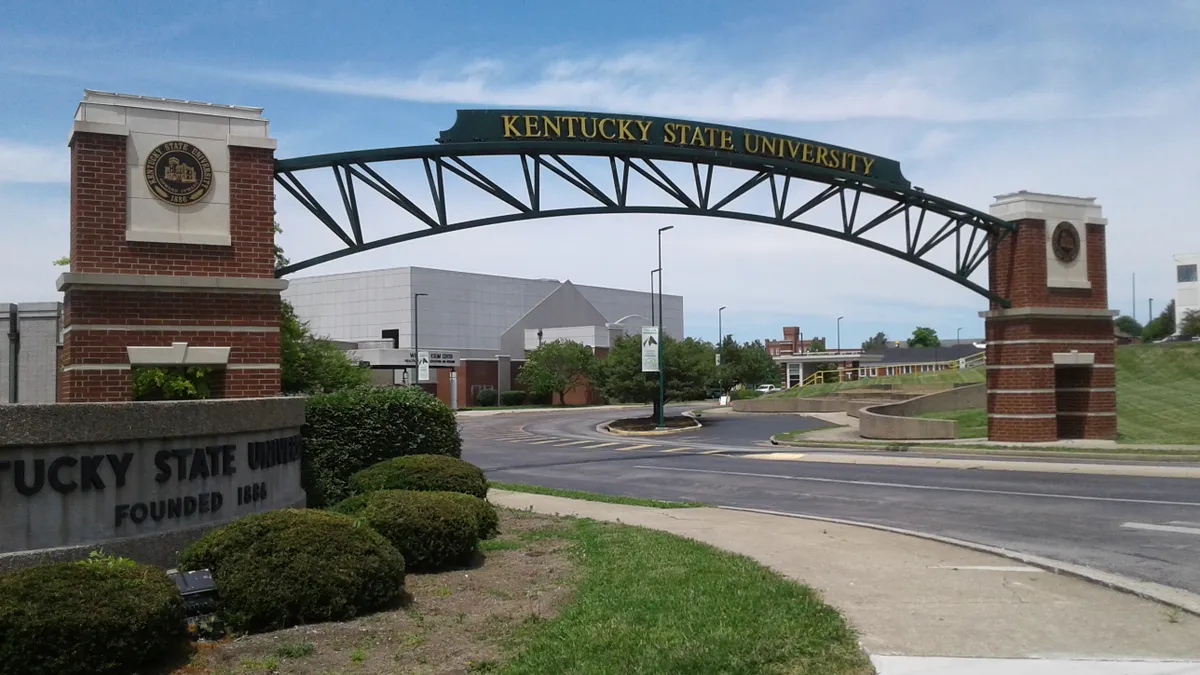Dive Brief:
- Poor financial management and overspending at Kentucky State University led to the historically Black institution's budgetary shortfall, which is estimated to be about $23 million, according to a state agency report.
- Kentucky's Council on Postsecondary Education released a review last week detailing the institution's financial troubles. It found that increased spending, particularly in the last few years, led to severe financial distress at the university.
- CPE is requesting that lawmakers allocate $23 million to Kentucky State to cover a budget shortfall in the 2022 fiscal year, as well as an additional $1 million annually until 2024 for programs to meet the state's needs.
Dive Insight:
The review is part of an executive order signed by Kentucky Gov. Andy Beshear that instructed CPE to analyze Kentucky State's finances. Beshear's directive came after the university's former president, M. Christopher Brown II, abruptly resigned in the summer amid concerns over the school's budget.
A couple of months later, the university revealed its financial troubles were dire. Officials said it would need emergency funding to stay open past the spring.
The new report sheds light on what caused the university's financial crisis.
"It wasn't one thing. It was just consistent overspending in a variety of areas," said Travis Powell, CPE's vice president and general counsel. "That was the biggest thing that jumped out: the lack of budgetary controls and how fast the reserves were depleted in such a short amount of time."
Kentucky State's budgetary issues come to light at a time of heightened concern over the finances and management at several HBCUs.
In Tennessee, a legislative analysis found Tennessee State University potentially missed out on up to $544 million in funding because the state may have failed to make required matching payments to federal grants given to the institution for decades. And this summer, South Carolina State University fired its president amid concerns that he hadn't improved enrollment.
Yet Kentucky State's budgetary issues are unique. Although the university's cash balances were stable in 2016 and 2017, its cash began rapidly declining in the 2018 fiscal year, according to the report.
Cash fell from $18.7 million in 2017 to $14 million in 2018. By the next year, it had plummeted to just $2 million. The decline in cash reserves between 2016 and 2020 came from a $35 million operating deficit over the period.
As the school's finances worsened, it used "several inappropriate techniques" to pay employee salaries, including missing vendor payments. Staff members said they were told not to answer their phones when vendors called and were threatened with dismissal if they disclosed the university didn't have enough cash to fulfill its obligations, according to the report.
In a statement provided to Higher Ed Dive, Kentucky State said it trusted the "thoroughness and accuracy" of CPE's assessment.
CPE did not find evidence that officials misappropriated or stole funds, even though they didn't always use them wisely, Powell said.
Kentucky State receives more revenue from state appropriations, government grants and contracts, and tuition and fees compared to similar HBCUs, "providing evidence that a strong basis for stable, recurring funding currently exists," according to the report.
The university has taken several steps to right its finances, including providing quarterly reports to the governing board and enforcing payment policies for students before they register, according to a statement. It also froze hiring except for key positions.
Powell is hopeful that lawmakers will approve the request for $23 million.
"We've gotten good feedback from some of the legislators we've talked to," Powell said, though he noted that they haven't made any promises. "I'm not counting on anything, but what I hear a lot is people support Kentucky State and want to see it to be successful."
The university echoed that view in its statement.
"Kentucky State officials are confident that legislators in the Commonwealth know and understand the 135-year legacy and intrinsic value Kentucky's only public, land-grant HBCU provides and the importance of stabilizing an institution that continues to impact the lives of a diverse population," it said.











